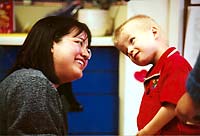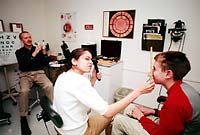|

|

|
NEWS SEARCH
|
|
|
|

|
UC Berkeley optometrists expand services to low vision outreach clinic at California School for the Blind
24 June 2002
By Sarah Yang, Media Relations
 |

Dr.
A. Mika Moy, assistant clinical professor of optometry,
meets with Liam McIntire, 5, of Fremont. Liam was diagnosed
with cortical vision impairment when he was 2, and often
tilts his head to help orient himself. Peg Skorpinski
photo
|
Berkeley
- Marcie McIntire noticed that her 5-year-old son, Liam, would
often close one of his eyes and tilt his head when talking with
her. It wasn't until optometrists from the University of California,
Berkeley, examined Liam's eyes at school that she understood
his vision problems.
"They
saw that he was sensitive to light, and that he does that
head tilt because it helps him orient himself," said McIntire,
who lives in Fremont. Liam was diagnosed at age 2 with cortical
vision impairment, a condition characterized by the brain's
inability to consistently understand input from the eyes.
"They also corrected the astigmatism on his glasses, which
was way off by 180 degrees," she said.
The
School of Optometry has been operating one of the few low
vision clinics in the state at the UC Berkeley campus for
more than 40 years, but last May, the school expanded its
services to an outreach clinic at the California School for
the Blind in Fremont. One year after the program began, UC
Berkeley optometrists have conducted comprehensive eye exams
for more than 80 students at the school.
"Unfortunately,
it can be hard for some families who live far away to make
it to our clinic in Berkeley. We saw an opportunity to bring
this care to the patients," said Dr. Edward Revelli, associate
dean of clinical affairs at the School of Optometry. Revelli
worked with administrators at the school for the blind to
launch the program.
Every
other Wednesday during the academic school year, low vision
specialists Dr. A. Mika Moy, assistant clinical professor
of optometry, and Dr. Robert Greer, associate clinical professor
of optometry, visit the school. Exams for each patient typically
last 90 minutes. The students are examined by the two clinicians
and a resident optometrist from UC Berkeley.
"Many
of the students here have multiple disabilities that are associated
with their visual impairment, and many doctors have not had
experience with these children," said June Waugh, low vision
services coordinator at the school for the blind. "What Robert
and Mika have been able to give us is practical understanding
of how the children see. They've been wonderful answering
our questions and sharing our concerns."
While
watching the optometrists conduct the eye exams, it becomes
clear that they are able to relate to their young patients.
Both the students and parents have noticed.
"I
was feeling kind of weird having my eyes out, and my good
friend Robert (Greer) helped me get over that fear," said
Justin Kennedy, 17, who was treated in February for an eye
infection that required removal of his prosthetic eyes.
Greer
explained the secret. "We could see that Justin had an infection,
so to persuade him to take the eyes out, we asked him to show
us how to remove and insert prosthetic eyes," said Greer.
That
extra motivation helped convince Justin to remove the eyes
and allow the doctors to diagnose and treat the infection.
After Greer smoothed out the scratches in the prosthetic eye
that had been the source of irritation, he told Justin his
eyes now looked shiny just in time for that night's Valentine's
Day dance.

Dr.
Shital Chatwani, a resident at UC Berkeley's School of
Optometry, gives Anthony "AJ" Machado, 16, his
first comprehensive eye exam with Dr. Robert Greer, associate
clinical professor of optometry, helping in the background.
UC Berkeley optometrists have been conducting exams for
students on site at the California School for the Blind
in Fremont since May 2001. Peg Skorpinski photo
|

|
Justin's
reaction? "It was a great success," said Justin. "I took my
girlfriend with me to the dance, and even kissed her on the
dance floor."
McIntire,
Liam's mother, said the optometrists took extra time to explain
her son's condition to her. "At this clinic, they really gave
me a lot of information about Liam's impairment and how he
functions, which has been really helpful because no one has
ever really done that before," she said.
There
are few eye care professionals available who have the expertise
and experience to thoroughly examine low vision patients,
defined by the National Eye Institute as those whose visual
impairment cannot be corrected by standard glasses, contact
lenses, medicine or surgery, and interferes with a person's
ability to perform everyday activities.
Experts
say it is difficult to support a private clinical practice
specializing in low vision care because the condition is considered
a low-incidence disability. According to figures from the
California Department of Education, approximately 651,000
people up to age 22 in the state receive special education.
Of those, approximately 4,500 are blind or visually impaired.
The
California Blindness Advisory Task Force released a report
last month outlining recommendations for educating visually
impaired students. The task force, established last year by
Delaine Eastin, California's superintendent of public instruction,
highlighted the importance of having professionals assess
the needs of visually impaired students from birth to age
22.
"It's
very clear that this clinic has been a wonderful asset for
the children at this school," said Eastin during a site visit
to the clinic at the California School for the Blind. "We
did not have the capacity to provide this service on our own.
UC Berkeley has given us a fabulous gift."
Stuart
Wittenstein, superintendent at the school for the blind, pointed
out that improving a child's eye health impacts the child's
classroom experience. "Some of the things a child learns from
the low vision clinic are that a certain type of lighting
works for them in the classroom, or a certain type of font
works for them on a computer screen," he said. "We want to
try to facilitate medical interventions for the students that
will help us as educators do a better job."
Moy,
who specializes in pediatric optometry, said observing the
patients outside the exam room is invaluable. "It helps that
we can evaluate these students in an environment that's familiar
to them," she said. "We can follow them around campus, and
we have access to their teachers, who interact with them on
a daily basis."
In
addition to the personnel, UC Berkeley provided $60,000 worth
of specialized equipment for the clinic, while the school
for the blind paid for the clinic's visual aids and set aside
space on school grounds for the exam room. Maryann McBee,
president of Parents and Friends, the school's parents association,
said the clinic has been so popular with the parents that
they are raising funds from private donations to help pay
its ongoing operating expenses.
UC
Berkeley's partnership with the California School for the
Blind has been mutually beneficial, said Revelli. He pointed
out that the school exposes UC Berkeley faculty and optometry
residents to a relatively large pool of patients, some with
rare conditions they might otherwise never encounter. "This
may change the future of a lot of our graduates who come out
of the low vision program," he said.
The
program currently serves students at the school for the blind,
but Superintendent Wittenstein said the school expects to
also open the clinic to children who are not enrolled at the
school.
###
|

|